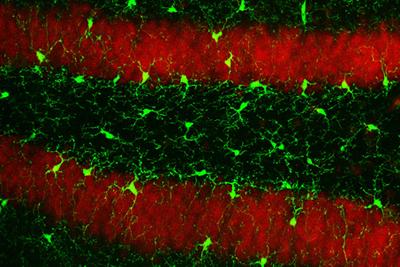‘Housekeepers’ of the brain renew themselves more quickly than first thought

Cells in the brain responsible for detecting and fixing minor damage renew themselves more quickly than previously thought, new research has shown.
A study, led by the University of Southampton and published in Cell Reports, shows that the turnover of the cells, called Microglia, is 10 times faster, allowing the whole population of Microglia cells to be renewed several times during a lifetime.
“Microglia are constantly scanning the brain to find and fix issues – you could call them the housekeepers of the brain,” said Dr Diego Gomez-Nicola, of the University of Southampton, who supervised the study. “We previously thought that microglia would renew themselves so slowly that a whole lifetime would not suffice to renew the whole population. But now we can talk about up to six renewal cycles in a lifetime. We now need to reinterpret how they interact and regulate the function of other brain cells to understand their full potential.”
The study, led by PhD student, Katharine Askew, assessed the proliferation of microglia, from both mouse and human brain, using staining of sections with specific antibodies alongside live imaging of the cells.
It also found that the number of microglial cells remains relatively unchanged from birth until ageing and is maintained by the spatial and temporal coupling of cell division and cell death.
The research was carried out in collaboration with researchers at the University of Tübingen (Germany), University of Oxford, University of Hamburg (Germany) and Achucarro Basque Center for Neuroscience (Spain).
The Southampton team believe this new research will help the understanding of Microglia’s behaviour in diseases like Alzheimer’s Disease. In Alzheimer’s microglia contribute to the person’s cognitive decline.
Dr Diego Gomez-Nicola added: “This finding provides a basic piece of cell biology, needed to understand the functions of microglia and their interaction with other cells in the brain. Understanding the clockwork of microglia will help understand their behaviour in psychiatric and neurodegenerative diseases of the brain like Alzheimer’s.”



